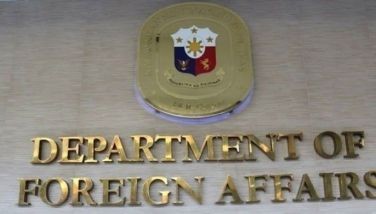Customs seize ingredients to make P100-M shabu
February 5, 2003 | 12:00am
A 20-foot container van full of equipment and ingredients enough to manufacture P100 million worth of shabu and passed off as a shipment of a photo processing chemical was seized yesterday by Customs officials at Manila’s South Harbor.
"Maybe you can say that these drug dealers were bold in attempting to smuggle these drugs through container vans," Customs Commissioner Antonio Bernardo told The STAR. "Perhaps because it is difficult to detect the real contents of container vans (which) are closed."
The ingredients used to make shabu were misdeclared as electron chemical preparations acidity detergent, a substance used by photo laboratories for developing pictures.
The ingredients and equipment were detected as early as mid-December last year, according to Customs Intelligence and Enforcement Group chief Deputy Commissioner Ray Allas.
After investigators conducted a test on the chemicals, the containers were left untouched — hoping the consignee would surface to claim it.
The shipment reportedly came from Taiwan and was consigned to a certain Hsu Yung Chin with a fictitious address of 896 Quezon Avenue, Manila. Another address in Pasay City led agents to a cargo forwarding office but the company denied any connection to the consignee.
"Apparently, the consignee learned that the drugs have been discovered so he did not come forward," Allas said.
Bernardo opened the van with Interior and Local Government Secretary Jose Lina and Philippine Drug Enforcement Authority (PDEA) chief Rodolfo Caisip and presented the seized cargo to reporters.
Bernardo said "this is the first time I heard of this sort of smuggling, at least during my term." Misdeclarations and underdeclarations, also known as "technical smuggling," were limited to finished goods.
Drug smuggling used to be confined to "pure smuggling" or sneaking in the illegal substance by dropping them off at sea using water-tight containers. The drugs are then picked up by smaller vessels and brought to shore.
Bernardo could not say if other drug shipments managed to slip in through the country’s commercial ports in the past.
He noted that investigators are looking into the possibility that the shabu manufacturing equipment and ingredients are connected to the multibillion-peso Valenzuela City shabu factory discovered by police last year, since the manufacturing equipment are of the same type as those confiscated in the factory.
Bernardo said the seized cargo will be turned over to the PDEA for further investigation as mandated by the Comprehensive Drug Act of 2002.
"Maybe you can say that these drug dealers were bold in attempting to smuggle these drugs through container vans," Customs Commissioner Antonio Bernardo told The STAR. "Perhaps because it is difficult to detect the real contents of container vans (which) are closed."
The ingredients used to make shabu were misdeclared as electron chemical preparations acidity detergent, a substance used by photo laboratories for developing pictures.
The ingredients and equipment were detected as early as mid-December last year, according to Customs Intelligence and Enforcement Group chief Deputy Commissioner Ray Allas.
After investigators conducted a test on the chemicals, the containers were left untouched — hoping the consignee would surface to claim it.
The shipment reportedly came from Taiwan and was consigned to a certain Hsu Yung Chin with a fictitious address of 896 Quezon Avenue, Manila. Another address in Pasay City led agents to a cargo forwarding office but the company denied any connection to the consignee.
"Apparently, the consignee learned that the drugs have been discovered so he did not come forward," Allas said.
Bernardo opened the van with Interior and Local Government Secretary Jose Lina and Philippine Drug Enforcement Authority (PDEA) chief Rodolfo Caisip and presented the seized cargo to reporters.
Bernardo said "this is the first time I heard of this sort of smuggling, at least during my term." Misdeclarations and underdeclarations, also known as "technical smuggling," were limited to finished goods.
Drug smuggling used to be confined to "pure smuggling" or sneaking in the illegal substance by dropping them off at sea using water-tight containers. The drugs are then picked up by smaller vessels and brought to shore.
Bernardo could not say if other drug shipments managed to slip in through the country’s commercial ports in the past.
He noted that investigators are looking into the possibility that the shabu manufacturing equipment and ingredients are connected to the multibillion-peso Valenzuela City shabu factory discovered by police last year, since the manufacturing equipment are of the same type as those confiscated in the factory.
Bernardo said the seized cargo will be turned over to the PDEA for further investigation as mandated by the Comprehensive Drug Act of 2002.
BrandSpace Articles
<
>
- Latest
- Trending
Trending
Latest
Trending
Latest
Recommended































